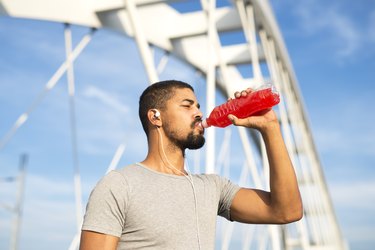
Advertised as providing a quick boost, energy drinks are popular with young adults, teens and even younger children, who often drink them like sodas. This can lead to side effects such as frequent urination, which may also have other underlying causes.
Causes
Video of the Day
The most obvious cause of urinary frequency is simply drinking large amounts of fluid. The more fluid you take in, the more urine you produce. Drinking large amounts of an energy drink, or any fluid for that matter, can lead to increased urination. Another common cause of urinary frequency is urinary tract infection, which should be ruled out if your symptoms persist even after you stop drinking the beverage.
Video of the Day
Sugar
Many energy drinks contain high levels of fructose and other sugars. One 16-ounce can, for instance, may contain up to 62 grams of sugar, or nearly 16 teaspoons. In a person with diabetes, this could rapidly increase blood glucose to abnormal levels. Because frequent urination and excessive thirst are hallmark symptoms of high blood sugar, appropriate action should be taken. This can include checking blood sugar if you have diabetes, or discussing symptoms with a medical doctor.
Caffeine
Urinary frequency can also be attributed to the caffeine content of energy drinks. Caffeine may be a mild diuretic that can lead to increased urination, particularly when taken in large amounts. Although many energy drinks claim to have have less caffeine that a cup of coffee, they may contain additional ingredients that can raise caffeine levels even higher.
Additional ingredients may include guarana, cocoa, kola nut or yerba mate. Each of these substances contains naturally occurring caffeine that will not be listed among the ingredients but contributes to increased levels. A study published in the February 2011 "Pediatrics" stated that each gram of guarana can contain anywhere from 40 to 80 milligrams of caffeine. Although the U.S. Food and Drug Administration regulates maximum caffeine amounts in soda to be no more than 71 grams per 12 ounces, it does not impose restrictions on energy drinks since manufacturers can categorize them as natural dietary supplements. The study also points out that many of the ingredients in energy drinks have not been studied and are not regulated, and safe levels of consumption have not been identified, particularly for children.
Effects
Besides being a nuisance, frequent urination may seem to lead to more serious complications such as dehydration. This is unlikely, however, since drinking the beverages provides additional liquid. A 2007 review published by The American College of Sports Medicine found no evidence to support the theory that caffeine has diuretic properties. The study found that contrary to popular belief, caffeinated beverages do not cause dehydration and contribute to hydration in a manner similar to pure water.